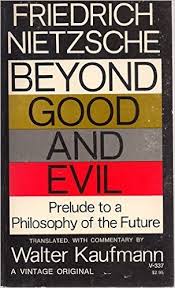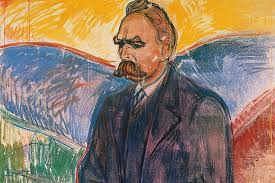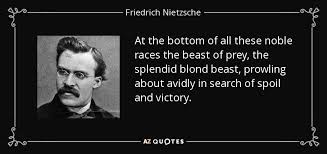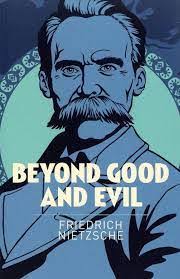Friedrich Nietzsche, Beyond Good and Evil (1886).
Good Reads meta-data is 240 pages rated 4.03 by 3930 litizens.
Genre: Non-Fiction. Species: musings.
DNA: Teutonic.
Verdict: Mad, bad, and brilliant.
Tagline: ‘Nietzsche will teach’ya.’

Nietzsche (1844-1900) has two reputations: First, as a harbinger of Naziism with his Übermensch, and this book folds into that. It is sometime erroneously supposed that he meant by the title that the Übermensch need not be bound by any morality. As is often the case with popular interpretations, he means the opposite. That the ordinary moralism of churchmen, editorialist, school teachers who label things ‘good’ and ‘evil’ is superficial, failing to plumb the depth and complexity of the lifeworld. In reality evil can come from good and good from evil, rather than being opposites these two intersect, interact, and sometimes one nurtures the other: yin and yang. If we accept and stop with the simple labels of these everyday moralists without question, we will never understand the deeper and disturbing reality.

His second reputation is as an obscurantist. It is certainly true that he makes demands on readers. Mainly because he so categorically rejects conventional wisdom, but also because he is not a systematic thinker (like Kant, Hegel, or Marx). He rejects and reviles such an approach. He contradicts himself, is inconsistent, and is incomplete and admits it, because life is like that.
But, if a reader relaxes and lets him flow there are rewards to be had without subscribing to his weltanschauung.

Part of his message is that a lived morality must be self-consciously chosen by the individual, akin to the message in the book of Matthew of the New Testament: Don’t do things because Christ tells you to do so, do them because they are right. It is a message as old as Aristotle: do the right thing, in the right way, for the right reason (because it is right). Nietzsche thought only a few people could accept this responsibility and do it. They who can do so should be, in fact, are the leaders of society. This kind of selection is only possible in authoritarian, aristocratic societies, so like Tocqueville, he preferred that social structure, in contrast to Matthew who thought everyone could and should do this or Tocqueville who did not assert his preference onto others. Nietzsche has no such restraints.
(By the by, this same message can be found in Immanuel Kant’s categorical imperative, but Nietzsche reviled Kant so much he would not admit it. Nietzsche often refers to the Chinaman, and that is his racist contempt for the man from Königsberg. That is, Kant was so determined to maintain the consistency of his elaborate system that it became detached from reality, like the European stereotype of a Chinese emperor.)
There is no doubt that Nietzsche was not a man of our time and the pygmies have made careers out of proving that obvious fact. For him race, class, gender all had decisive meaning. He justified slavery. Smelled the herd in democracy or socialism. He regarded women as barely human. He drank deeply of Richard Wagner’s music, imbibing a heady Teutonic mysticism, which he denied while wallowing in it. Some of this is shaded by contemporary translators who elide, soften, gloss, mute these declamations.
All that said, still his prose burns bright. Here are a few illustrative passages with my comments beneath, after the dash.
Preface. ’all great things have first to wander about the earth as enormous and awe-inspiring caricatures.’
– it takes time for new ideas to be accepted, but once they are accepted, they wander further all around the world.
’22. Let me be pardoned, as an old philologist who cannot desist from the mischief of putting his finger on bad modes of interpretation, but ‘Nature’s conformity to law’…exists only owing to your interpretation…. Scientific findings are not matter merely matters of fact, but a human interpretation and invention.
– truth consists of concepts not naturally occurring facts, e.g., an average, the atom, gravity, ….all are concepts.
28. ‘But how could the German language, even in the prose of Lessing imitate the tempo of Machiavelli, who in his ‘ll Principe’ makes us breathe the dry, fine air of Florence, and cannot help presenting the most serious events in a boisterous allegrissimo, perhaps not without a malicious artistic sense of contrast he ventures to present – long, heavy, difficult, dangerous thoughts and a tempo of the gallop, and of the best, most wanton humour.’
– Machiavelli’s prose has a cadence, true, but the air of Florence was seldom fine along the sewer the Arno often was.
42. ‘as far they allow themselves to be understood – for it is their nature to wish to remain something of a puzzle – these philosophers of the future’
– did he anticipate the wizard Martin Heidegger who do not want to be understood because that would reveal that there is nothing behind the curtain to reveal.
44. ‘Need I say expressly after all this that they will be free, very free spirits, these philosophers of the future – as certainly also they will not be merely free spirits, but something more, higher, greater and fundamentally different, which does not wish to be misunderstood and mistaken?’
– ditto above.
46. religion represents a suicide of reason
– compare to H. L. Mencken on the body count of religions.
’63. He who is a thorough teacher takes things seriously and even himself – only in relation to his pupils.’
– few meet this requirement.
144. ‘When a woman has scholarly inclinations there is generally something wrong with her sexual nature. Barrenness itself conduces to a certain virility of taste; man, indeed, if I may say so, is “the barren animal”.’
– sounds like a contemporary US Republican which party will soon ban women from higher education.
146. ‘He who fights with monsters should be careful lest he thereby become a monster. And if thou gaze long into an abyss, the abyss will also gaze into thee.’
– you become what preoccupies you.
169. ‘To talk much about oneself may also be a means of concealing oneself.’
– talk can be a way of not communicating.
206. ‘The worst and most dangerous thing of which a scholar is capable results from the instinct of mediocrity of his type, from the Jesuitism of mediocrity, which labours instinctively for the destruction of the exceptional man….’
– ever more about ever less.
‘the objective man’
‘the lulling poppy of scepticism’
‘the conceited ape’
‘a kind of safety police’
214. ‘we firstlings of the twentieth century’
‘good conscience is the respectable pigtail of an idea.
– loved all the above bons mots.

219. ‘The practice of judging and condemning morally is the favourite revenge of the intellectually shallow and it is an opportunity for disguised malice.’
– the mediocre scholar delights in deprecating great achievers.
228. virtue has been more injured by the tediousness of its advocates than anything else.
– ditto
English happiness [utilitarians]
footsteps to self-knowledge
239. unlearns to fear
– this one reminds me of a passage in Machiavelli.
252 ‘They are not a philosophical race – the English: Bacon represents an attack on the philosophical spirit generally, Hobbes, Hume and Locke, an abasement, and a depreciation of the idea of a “philosopher” for more than a century. It was against Hume that Kant uprose and raised himself; it was Locke of whom Schelling rightly said, “Je méprise [I despise] Locke”; in the struggle against the English mechanical stultification of the world…’
253. ‘There are truths – which are best recognised by mediocre minds because they are best adapted for them, there are truths which only possess charms and seductive power for mediocre spirits.’
– intellectuals can’t see the obvious. Instead all too often offer elaborate explanations of the dead obvious.
260. master-morality; slave-morality
‘According to slave-morality, therefore, the “evil” man arouses fear, according, to master-morality, it is precisely the ‘good’ man who arouses fear and seeks to arouse it, while the bad man is regarded as the despicable being.’
- what rouses the mediocre scholar is not an evil man but a good one, whose example is an embarrassment to his small mind, so he endeavours to bring the great low.
273. ‘A man who strives after great things, looks upon everyone whom he encounters on his way either as a means of advance, or a delay and hindrance – or as a temporary resting-place.’
- users all.
274. ‘He who does not wish to see the height of a man, looks all the more sharply at what is low in him, and in the foreground – and thereby betrays himself.’
– the valets of the world, pace Hegel. The 3rd reader!
***
While browsing in the Argyle Emporium in Goulburn I came across this cantankerous old frenemy. Idly, I picked it up and flipped a few pages and started to read, and kept reading, so I decided to buy. I once had a copy of it in a collection of his works that I shed when I downsized from the university office, thinking I would not get back to it.

P.S. Nietzsche did warn us in the Genealogy of Morals about the blond beast of prey that pounces on a population with terrible claws driven by insatiable egoism. If any of that sounds familiar go the head of the class.
P.S. The opening quotation is from Monty Python’s The Meaning of Life (1983), Bruce’s song.

